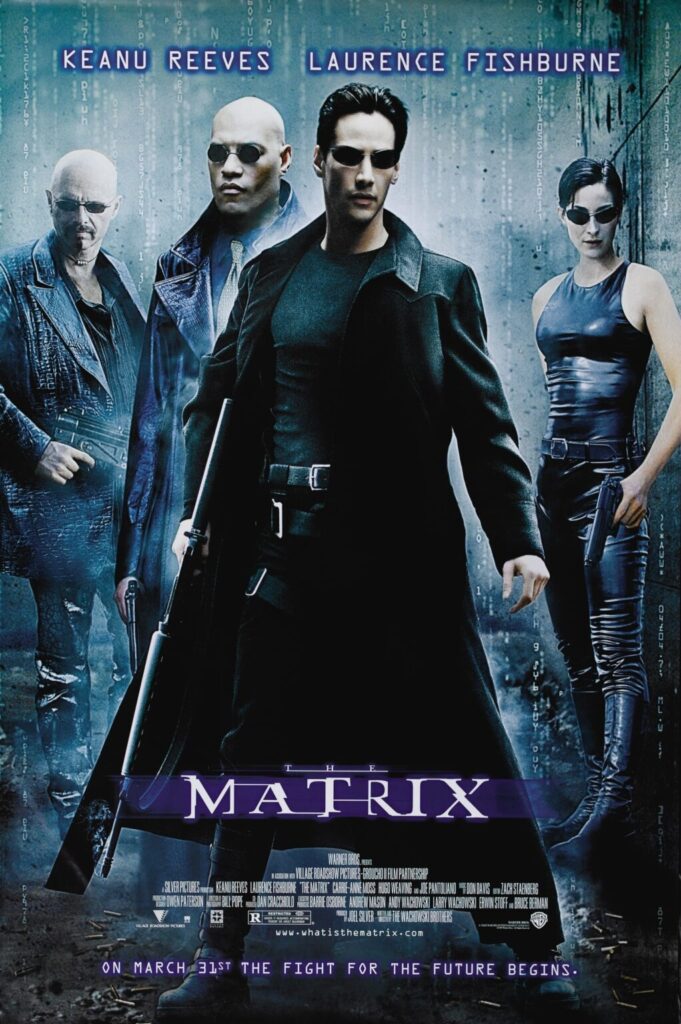A review of classic “The Matrix” in 2023.

Released in 1999, “The Matrix” instantly became a cultural phenomenon, altering the course of science fiction cinema and forever ingraining itself in collective imagination. Directed by the Wachowskis, this groundbreaking film redefined the boundaries of reality and pushed the limits of visual effects, creating a mesmerizing and thought-provoking experience that continues to captivate audiences today.
At the heart of “The Matrix” lies a compelling narrative that explores the concept of reality and the nature of existence. Keanu Reeves stars as Thomas Anderson, a computer programmer by day and a hacker known as Neo by night. His life takes a surreal turn when he encounters Morpheus, played by Laurence Fishburne, who reveals the unsettling truth about the world: humanity is enslaved by intelligent machines, and the reality they perceive is a simulated construct called the Matrix. This revelation serves as the catalyst for an epic journey that blurs the line between the real and the virtual.
The film’s strength lies not only in its groundbreaking premise but also in its execution. The Wachowskis’ visionary direction creates a visually stunning and atmospheric world. The distinctive green-tinted color palette of the Matrix, coupled with the iconic bullet-dodging scenes and kung fu-inspired fight sequences, remains etched in cinematic history. The Matrix effectively introduced “bullet time” technology, allowing for the manipulation of time and space in a manner that was previously unimaginable, setting a new standard for action filmmaking.
Keanu Reeves delivers a career-defining performance as Neo, effortlessly transitioning from a mild-mannered programmer to a messianic figure determined to liberate humanity. His journey from uncertainty to self-discovery mirrors the overarching theme of the film, as he grapples with the existential questions posed by his newfound reality. Laurence Fishburne’s portrayal of Morpheus exudes wisdom and gravitas, serving as a mentor figure whose unwavering belief in Neo’s potential is both inspiring and pivotal to the story.
Carrie-Anne Moss shines as Trinity, a fierce and enigmatic warrior who becomes Neo’s confidant and love interest. Moss’s portrayal defies traditional gender roles in action cinema, making her character a trailblazing symbol of empowerment. The chemistry between Reeves and Moss is palpable and adds depth to the film’s emotional core.
Hugo Weaving’s Agent Smith is a standout antagonist, embodying the cold and relentless nature of the machines. His monologues about the human race are delivered with a chilling precision, making him a memorable and formidable adversary.
Beyond its technical achievements and stellar performances, “The Matrix” delves into philosophical and existential themes that continue to resonate. It challenges viewers to question the nature of reality, free will, and the role of technology in our lives. The film’s allegorical elements draw from a variety of sources, including cyberpunk literature and Eastern philosophy, providing ample fodder for intellectual discussion.
“The Matrix” is not without its flaws, as some may find the dialogue occasionally veering into the overly philosophical. However, these moments are outweighed by the film’s ambition and overall impact.
“The Matrix” is a cinematic masterpiece that has left an indelible mark on both science fiction and action genres. Its groundbreaking visual effects, compelling performances, and philosophical depth make it a timeless classic that continues to inspire and influence filmmakers. Even over two decades since its release, “The Matrix” remains a must-see for those seeking an exhilarating and thought-provoking cinematic experience. It’s a film that challenges everyone to question the nature of reality, and reminds us that, sometimes, the truth is stranger than fiction.




